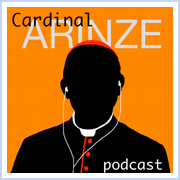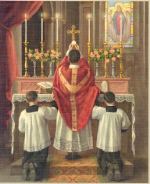"And He is the propitiation of our sins, and not for ours only, but also for those of the whole world." (1 John 2:2)
IThe magnitude of Christ's sufferings becomes manifest when viewed in connection with the person of the sufferer. The damned suffer in hell, but they suffer justly, for they revolted against God. The holy souls suffer in purgatory, but they too have deserved punishment and have need of purification. Men suffer here on earth; sorrow is the portion of mankind in this vale of tears. But in the person of Jesus it was the Son of God, the embodiment of innocence and holiness, the Lord and Creator of all things that suffered.
In time of war the rank and file of soldiers have to undergo the privation and hardships incidental to their lot as soldiers; and however much we may admire their endurance we would admire still more the heroism of the leader himself, he who is the head of the whole army, if he were to associate and identify himself with these sufferings, embracing them voluntarily in his own person. In this latter case the suffering is of immeasurably higher value.
Oh, the magnitude of the sufferings of Christ, the Son of God, who was crucified and died for us! You may reply, that after all Jesus Christ did not suffer in His divine nature, but only in His human nature. That is true. The divine nature is as incapable of suffering as of death, but it is equally true that His human nature belonged to the person of the Son of God.
It was the body and the soul of the Son of God; the pains, the wounds, the sufferings, the death pangs were those of the Son of God; so, we may rightly say, the Son of God suffered, the Son of God died.
IIThe depth of suffering which Christ our Lord underwent for our sake is brought home to us very forcibly when we consider in themselves the pains which He endured. All through His life He was never free from suffering, and suffering of such an order that its like has never been experienced on this earth.
I will not ask you to trace step by step the weary road of poverty, toil, and prayer, which our Saviour humbly traveled here below. I want to emphasize one thing only: namely, that
His passion was ever present to Him, that the cross was the central point of all His thoughts.
If He foresaw our life and our death, He foresaw also His own, for He was omniscient and had foretold His passion. Trouble that is foreseen clearly and distinctly presses on the soul in anticipation. When a mother hears from a doctor that a beloved child has only a few weeks or a few months longer to live, every look at her darling child cuts her to the heart, reminding her of the death-struggle, the coffin, the grave that are drawing nearer and nearer. Not a single hour or day of our Saviour's life was free from pain and suffering. "My sorrow is continually before Me" (Ps. 37:18).
It may be urged that the actual passion of our Saviour wa~ compressed into a few hours. Yet, consider what a road of agony he traveled in that short space of time: from the Garden of Gethsemani stained with His sweat of blood, to the house of the high priest; from the high priest to Pilate; from Pilate to Herod, and back again to Pilate, who sent Him, laden with His Cross, to Calvary and to death; His way was lined with enemies on all sides, priests and people, pagans and Jews, men of high and low degree: "Many are they who rise up against Me" (Ps. 3:2).
How manifold were His pains, how numerous were His wounds, how cruel the blows with which He was struck, how great His loss of blood! There was no member of His body, no power of His soul, that did not suffer.
If viewed only from the outside, so to speak, His sufferings are heavy beyond all question, but, in addition to and before everything else, we have to take into account the inward desolation of His soul. To this desolation His friends and His apostles who forsook Him greatly contributed; and it was increased further by the cruelty of His enemies, who, not satisfied with tormenting and torturing Him, mocked and jeered at His anguish.
At the thought of the many souls for whom all His sufferings would not only be in vain, but would constitute even a further occasion of sin, this desolation welled up in His heart like a deep spring whose bitterness was but further increased by the thought of His heavenly Father, for by Him, too, He felt Himself forsaken. Oh, the intensity of the sufferings of Christ!
Added to this we have to remember that the sacred humanity of Christ was in the highest degree sensitive and sensible. When a war breaks out, swords are polished and sharpened with special care; their whole virtue lying in their capacity to cut. Our Saviour, assuming our human nature with the one object and purpose of suffering and dying, chose to take to Himself, with such an end in view, a body and soul with an organization peculiarly adapted for suffering.
IIINot only are the sufferings of Christ great in themselves, their magnitude is increased and enhanced by the manner in which they were embraced and endured. Our Saviour suffered voluntarily. He said:
"Not my will, but Thine be done." At the first appearance of His enemies who had come to apprehend Him, advancing toward them He asked,
"Whom do you seek?" and when they answering said, "Jesus of Nazareth," He at once declared Himself:
"I am He" (John 18:6). As He spoke these words, in order as it seemed to convince them that the Son of God was subject to no creature against His will, He allowed His almighty power to overcome them, suffering them to fan helpless and impotent to the ground.
His life was one of devoted patience, meekness, and holiness; it was full of strength and resoluteness, and was inspired and animated by the love of God, obedience to the heavenly Father, and love of mankind. Adorned with every virtue, it is the model and example of lives for all time, teaching us that patient suffering is beautiful and lovable, worthy to be admired and imitated; filling our hearts with love and sympathy and making the patient endurance of pain meritorious and precious in the sight of God and men.
IVWe would have learned but very imperfectly the lessons taught us by the life of Christ if we failed to estimate the fruit of His sufferings. "Why did Christ suffer and die?" asks the catechism. "Christ suffered and died for our sins." The great and wonderful result of the passion of Christ is that it atoned for the sins of the whole world.
We speak of atonement only when there has been some offense, some insult to be made good, and in every single sin that has ever been committed insult has been offered and offense given to the great Law-giver, the high and eternal Judge. When insult has been offered to anyone reparation is demanded and exacted, and almighty God demanded complete and full reparation, such reparation as amply compensated Him for the glory of which He was robbed by sin, making good the offense given Him, and completely restoring the honor due to Him.
The greatness of the reparation must bear some proportion to the status of the person to whom it is offered, and how is an offense against the majesty of almighty God to be measured? To deal a child a blow in the face is a rupture of the peace, and to strike a judge is a criminal offense, but so to treat the majesty of a king would be high treason.
On a certain occasion a captain of the French troops struck Pope Boniface VIII a blow in the face with his mailed hand and the whole of Christendom rang with indignation and horror at such an act.
Now, what is sin? It is an offense against the infinite majesty of God and calls for reparation and atonement of an infinite order. Who is to afford to God this reparation? We are but weak men; sinners ourselves and finite beings; how can we repair an infinite wrong? The angels and the holy Mother of God herself, innocent and pure though they be, are but finite creatures and as such could not restore to the infinite God the honor He had lost.
But Jesus Christ, at one and the same time true God and true man, could do it. As head of the whole human race He could offer in our name full and complete satisfaction for the sins of the world, by suffering whatever the heavenly Father required of Him:
"Obedient unto death; even to the death of the cross" (Philipp. 2:8). His sufferings furnished a complete atonement which, vicariously offered, fully satisfied the divine justice. As the Saviour lay dying on the cross the shameful chains laid by the evil spirit upon men were loosened; as His precious blood flowed from His sacred wounds the terrible flames of hell were extinguished.
The sufferings of Christ atoned, not only completely, but, superabundantly, to the divine justice: "With Him there is plentiful redemption" (Ps. 129:7). They have won for us all graces; they have restored us to the position of children of God, and opened once more the gates of heaven so long closed against us.
Our Saviour's sufferings were bitter indeed, but to us they are of unspeakable value. Who can estimate the evil they have overcome, or count the blessings which have flowed from them? Never has a tree borne fruit so sweet, so precious as the tree of the holy cross.
Because Christ endured His passion for all and each one of us have we, then, all a right to consider ourselves saved and blessed? By no means. There remains something for us to do, which some of us are apt to neglect. If we want to have part in the redemption of Christ we must believe in the Saviour, in His divinity, in His love, His sufferings and merits, fixing in this way all our hopes in Him and His sacred passion.
We must gather for ourselves the fruit of the cross, by using with contrite and grateful hearts, and in the spirit of penance and humility, the means of salvation placed in our hands by our Saviour in the holy Sacraments; and earnestly try to follow Him by walking in His footsteps.
"If any man will come after Me, let him deny himself and take up his cross and follow Me" (Matt. 16:24).
How blessed is he who thus reaps the fruit of the sufferings of Christ! How truly miserable is that soul who, in spite of the grace of God, goes to perdition; it is as though, standing by a fresh spring of water, he were to die of thirst. I thank Thee, O Lord Jesus Christ, that Thou hast died for me. May I never deserve to forfeit the merits of Thy precious blood, and of Thy infinite sufferings. Amen.
_______________________
Adapted from Popular Sermons on the Catechism, [Vol 1, No.41]
by Fr. A. Hubert Bamberg (Edited by Fr. Herbert Thurston, S.J.
© 1914 by Benziger Brothers









